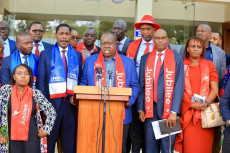- Overcoming the struggle with inclusion requires examining our tendency to prefer neighbours who fit specific criteria while excluding those deemed undesirable.
Inclusion is a transformative process that seeks to dismantle marginalization and establish a culture where everyone can equally enjoy privileges.
It is an intentional practice that places all individuals at the centre, fostering indiscriminate neighbourliness. Inclusion goes beyond mere tolerance; it delights a person's humanness and dignity from their position in social stratification.
Congregations that embrace a culture of neighbourliness are more likely to be welcoming to marginalized groups.
The biblical invitation, "Come to me all who are weak and heavy laden, and I will give you rest," exemplifies the all-encompassing nature of inclusion. The call to "Come!" is universal and extends to all individuals.
The promise of preservation is available to anyone who believes. However, systemic marginalization of certain groups within the church, such as women and youth, can be attributed to a power-oriented mentality that prioritizes control over love.
Read More
Overcoming the struggle with inclusion requires examining our tendency to prefer neighbours who fit specific criteria while excluding those deemed undesirable.
When given the power to choose, individuals may inadvertently perpetuate exclusionary practices. This power dynamic leads to discrimination against the weak, as standards of desirability are set, excluding those who do not meet them.
This error can be rectified by recognizing that the strong cannot indeed exist without the weak. In the Christian worldview, the inclination to exclude is countered by the centrality of love, which transcends societal divisions and dismantles barriers.
Creating a culture of inclusion requires intentional effort and a shift in perspective. It begins by acknowledging that each individual possesses inherent worth and deserves equal treatment.
Love becomes the guiding principle that informs our interactions and decisions, overriding the impulse to exclude based on arbitrary criteria. In an inclusive community, the inherent value of every person is recognized, celebrated, and protected.
Overcoming inclusion challenges necessitates confronting biases and prejudices that may hinder our ability to embrace others fully. It requires embracing diversity and valuing the contributions of all individuals, irrespective of their social standing or background.
By fostering empathy, understanding, and respect, we can break down the barriers that divide us and create spaces where everyone feels welcomed and valued.








